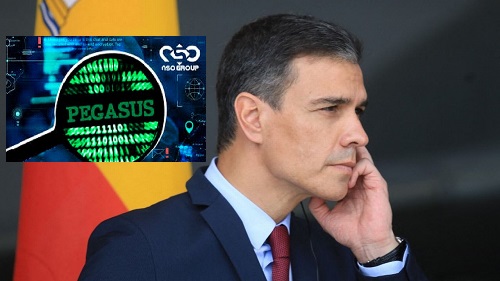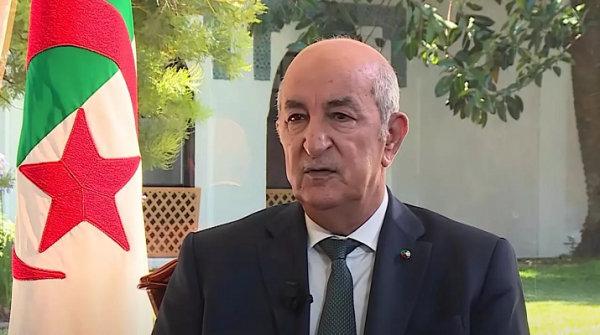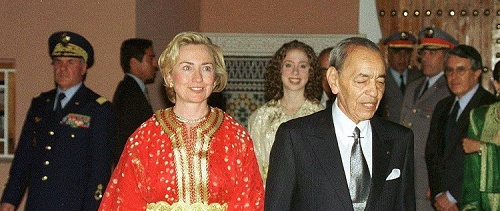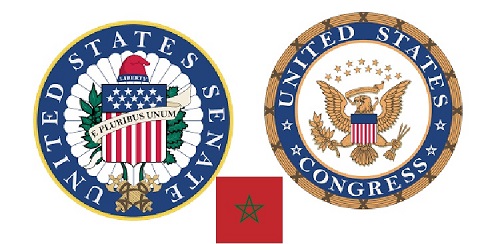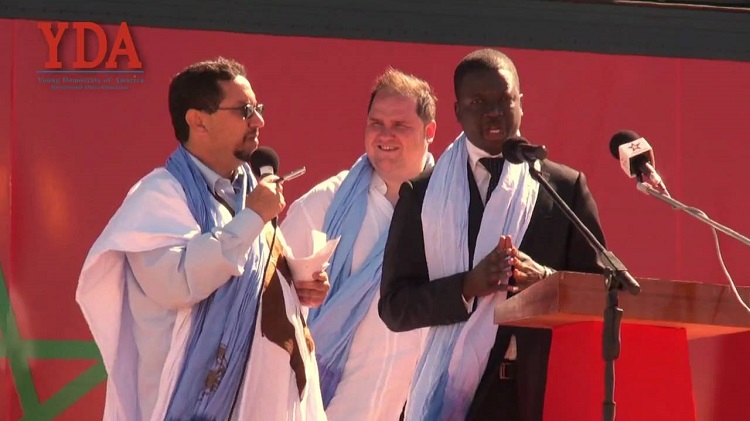Topics : Morocco, United States, USA, Congress, Senate, lobbying,
1801 18th Street, NW, Washington, DC 20008 p: 202. 299.9599 | www.moffettgroupdc.com
To: His Excellency Rachad Bouhlal
Moroccan Ambassador to the United States
From: Toby Moffett
Chairman, The Moffett Group
Date: August 28, 2012
Re: The 2012 Elections for the US House and Senate: What’s At Stake For Morocco?
Mr. Ambassador,
The goal of this analysis is to provide you and Moroccan officials in Rabat with various scenarios related to the upcoming United States elections and how the results might affect the U.S.-Moroccan relationship. In other words, who are the likely winners among those with jurisdiction over issues of interest to Morocco?
As you know, this is not an exact science. We have no way of knowing who will win in certain races where the races are close and the campaign is hard-fought. As we have seen in recent days, a number of unforeseeable events and circumstances can shift the fortunes of individual candidates and even of an entire party, i.e. the selection of Rep. Paul Ryan as Governor Romney’s running mate, the damaging remarks by Rep. Todd Akin in the Missouri Senate race, and the economic data that indicates the economy is not improving.
Please note that this analysis is based on what we are observing at the moment and the reality on the ground. Nonetheless, our assumptions are that the House of Representatives will remain under Republican control (the Republicans currently hold a 49-seat advantage (242-193). We believe a new Republican House majority in the 113th Congress will have a margin of only a handful of votes.
With regard to the U.S. Senate, we believe that either party could control the Senate, with no more than a one or two vote margin. Currently, the Democrats currently hold a 6-seat advantage (53-47). Given the races that are considered “toss-ups,” we view a Democrat majority in the Senate as slightly more likely than a Republican one.
COMMITTEES MOST IMPORTANT TO MOROCCO AND POSSIBLE LEADERSHIP CHANGES
Both the Foreign Affairs Committee in the House and the Foreign Relations committee in the Senate are vitally important to Morocco, especially with regard to matters relating to the Western Sahara dispute and any un-related issues.
At the same time, the Appropriations committees – particularly the Subcommittees on State-Foreign Operations – are extremely relevant as all foreign assistance money, both military and civilian, are approved by these committees in the House and Senate. 1801 18th Street, NW, Washington, DC 20008 p: 202. 299.9599 | www.moffettgroupdc.com
Aditionally, given the increasing importance of security-related matters, especially relating to the Western Sahara but also in Mali and other parts of North Africa, the Select Committees on Intelligence in both chambers are becoming more and more important to Morocco.
MOST LIKELY CHANGES IN COMMITTEE LEADERSHIP
Two key committees in the House and Senate may both have new leadership when the 113th Congress convenes in January 2013. Both the House Foreign Affairs Committee and the Senate Foreign Relations Committee could have new chairmen/women.
In the House, the current chairwoman, Rep. Ileana Ros-Lehtinen (FL) faces a party-imposed term limit, so there certainly will be a new chairman. Please see below for our analysis of the prospects for new leadership.
In the Senate, with the departure of Secretary Hillary Clinton as Secretary of State following the November election, there is a distinct possibility that Senator John Kerry (MA), currently the chairman of the Senate Foreign Relations Committee, would become Secretary of State should President Obama be re-elected. This would automatically leave the senate chairmanship vacant.
SENATE COMMITTEE ON FOREIGN RELATIONS
DEMOCRATS
If the Democrats retain control of the Senate, and Senator Kerry is not chosen as the new Secretary of State, he would remain the leader of the committee. But if Kerry departs, there are several veteran Democrats who might become chair of the committee.
Currently second in seniority on the Foreign Relations Committee, Senator Barbara Boxer (CA) also serves as chairwoman of the Environment and Public Works Committee. It is in our view unlikely, but not impossible, that she would relinquish that position to take over Foreign Relations.
Another possible chairman is Senator Bob Menendez (NJ). He is currently in a harder-than-expected re-election race in New Jersey, but is almost certain to retain his seat. If so, and if Senator Kerry departs for the State Department, Senator Menendez would almost surely choose the Foreign Relations chair. He is passionately supportive of Morocco. His chief focus, as a Cuban-American, is on matters impacting Cuba, but he would be very positive towards Morocco. 1801 18th Street, NW, Washington, DC 20008 p: 202. 299.9599 | www.moffettgroupdc.com
Behind Menendez in seniority is Senator Ben Cardin (MD). He is another long-time supporter of Morocco and its position on the Western Sahara. He is a Jewish-American and has been positively influenced by various U.S. Jewish groups who support Morocco and appreciate its relationship with Israel and the Moroccan diaspora in Israel.
REPUBLICANS
The primary defeat of Richard Lugar (IN), the committee’s top Republican since 1985, has ignited speculation as to which Republican senator would assume their party’s top position on this committee.
If Republicans win control of the Senate, the most likely new chair of the committee would be Senator Bob Corker (TN). While by no means as skilled and focused on foreign relations as the past two chairman – now-Vice President Joe Biden or Senator Kerry – Corker has increasingly shown more interest and greater knowledge of the world. We have every reason to believe the Senator Corker, as committee chairman, would be supportive of Morocco, specifically on the Moroccan framework for resolving the Western Sahara dispute.
Corker, however, may choose to forego that chairmanship for another. It is quite possible that should the Republicans control the Senate, Corker would select the chairmanship of the Banking Committee where he occupies a senior position.
In that case, two other Senators may inherit the Foreign Relations chair, and neither have a great deal of experience in foreign affairs. Both are relatively junior members: Senator Jim Risch (ID) and the other is Senator Marco Rubio (FL).
With regard to the Subcommittee Near Eastern and South and Central Asian (which has jurisdiction over Morocco), if current Ranking Member Sen. Risch does not assume the chairmanship of the full committee, it is expected that he would become chair of that subcommittee. Another possible chair of the subcommittee is Senator Mike Lee (UT). From all indications, both of these Senators would be supportive of Morocco’s approach on the Sahara.
HOUSE COMMITTEE ON FOREIGN AFFAIRS
The House Foreign Affairs Committee faces significant change next year because of Republican term limits for its chairwoman and an uphill re-election battle for its ranking Democrat. There are also a slew of senior members retiring from both parties. So, regardless of who controls the chamber, the committee is poised to feature an almost entirely new lineup in its upper ranks in the 113th Congress. 1801 18th Street, NW, Washington, DC 20008 p: 202. 299.9599 | www.moffettgroupdc.com
REPUBLICANS
Despite only getting one Congress as chairwoman of the committee, Rep. Ileana Ros-Lehtinen (FL) is coming up against House Republican term limits for committee leaders at the end of the 112th Congress. Republican leaders count time served as ranking member toward their three-term cap on committee chairmanships, and Ros-Lehtinen served as the senior most Republican on the panel in the 110th (2007-2008) and 111th (2009-2010) Congresses. Unless the party leadership grants her a waiver – which is a very rare occurrence – she will be forced to give up the gavel.
There is a chance that Rep. Ros-Lehtinen could make a legitimate pitch for a term-limit waiver based on the fact that she is the only female and only Hispanic member chairing a House committee. Both GOP members who sought waivers from their party last Congress, however, were rejected and that is not expected to change in the 113th Congress.
Rep. Chris Smith (NJ) is next in seniority and actually has more seniority in Congress than Ros-Lehtinen. He was passed over, however, for ranking member when Rep. Ros-Lehtinen took the top Republican spot in 2007. He was also stripped of the Committee on Veterans’ Affairs chairmanship at the start of the 109th Congress, after a standoff with GOP leadership over veterans’ health care funding.
Rep. Smith has a tendency to go his own direction on the issues he is passionate about – most notably abortion and human rights – regardless of the political or diplomatic implications, which is a significant obstacle to any chairmanship aspirations. There is a chance, however, that Republican leadership would bow to his decades of experience on the committee. He is currently the chairman of the Subcommittee on Africa, Global Health and Human Rights (AGHHR).
It is important to note that Rep. Smith has joined virtually every call for religious freedom in Morocco made by U.S. officials, particularly his congressional colleagues. He was very outspoken against the Moroccan government when it ordered Christian proselytizers to leave the country.
A more likely possibility is that Rep. Ed Royce (CA) will leapfrog Rep. Smith and Rep. Dana Rohrabacher (CA) – seen by Republican leaders as too unpredictable – for the top position. The other senior Republicans on the committee, Rep. Dan Burton (IN), Rep. Elton Gallegly (CA) and Rep. Donald Manzullo (IL) are all retiring this year.
Rep. Royce is currently the chairman of the Subcommittee on Terrorism, Nonproliferation and Trade, has been a quiet, but steady, voice on foreign affairs from the committee. He also 1801 18th Street, NW, Washington, DC 20008 p: 202. 299.9599 | www.moffettgroupdc.com
has been a team player on party politics, kicking in more than $200,000 from his campaign account to the National Republican Congressional Committee (NRCC) this cycle. There is a chance, however that Rep. Royce could get the chairmanship of House Committee on Financial Services next year because current chairman Rep. Spencer Bachus (AL) is also term-limited and Royce is third in line in terms of seniority.
If Royce takes the chairmanship of the Financial Services Committee, Rep. Steve Chabot (OH) could become chairman of the Foreign Affairs Committee. Rep. Chabot, currently the chairman of the Subcommittee on the Middle East and South Asia, served in the House from 1995 to 2008 before losing re-election, only to win back his seat in 2010.
With regard to the chairmanship of the Subcommittee on Africa, if Rep. Smith is passed over again for the chairmanship of the full committee, he will most likely retain the gavel of this subcommittee. If, however, he assumes the chair of the full committee, Rep. Jeff Fortenberry (NE) is next in line on the subcommittee. The other three Republican members of that panel Rep. Tom Marino (PA), Rep. Ann Marie Buerkle (NY) and Rep. Bob Turner (NY), are all freshman members and therefore most likely not in a position to become subcommittee chair.
DEMOCRATS
Ranking Member Rep. Howard Berman (CA) is currently in a tough race for reelection against fellow Democrat and Foreign Affairs Committee member Rep. Brad Sherman (CA), thanks to redistricting in California. Berman finished second to Sherman in California’s new “jungle” primary system in June. Since the two incumbents were the top two finishers, they will face off again in the general election in November. Rep. Sherman has benefited from the newly redrawn district because it encompasses far more of his old district than Rep. Berman’s. As of now, Rep. Berman is the underdog.
If Rep. Berman somehow manages to come out on top in November, he will retain his position as top Democrat on the Foreign Affairs Committee. If Rep. Sherman defeats Rep. Berman (as is expected), he would also be well positioned to take over the top Democratic spot on the committee.
The two members ahead of Rep. Sherman on the Foreign Affairs Committee are Rep. Gary Ackerman (NY) and Del. Eni F.H. Faleomavaega (American Samoa). Ackerman is retiring at the end of the 112th Congress. Del. Faleomavaega has indicated interest in the post should Berman lose his race, but there is little precedent for a non-voting member to serve as chairman of a full committee.
If Democrats manage to win back the majority of the House the chairmanship would likely go to whichever member survives the Berman-Sherman primary. Democrats tend to stick 1801 18th Street, NW, Washington, DC 20008 p: 202. 299.9599 | www.moffettgroupdc.com
more closely to seniority for committee assignments than Republicans. The next two Democrats on the committee after Rep. Sherman are Rep. Eliot Engel (NY) and Rep. Gregory Meeks (NY).
With regard to the key Africa subcommittee(which in the House has jurisdiction over Morocco-related matters) freshman Rep. Karen Bass (CA) has held the top spot since the unfortunate passing of Rep. Donald Payne (NJ) in March. Rep. Bass is likely to retain this post, though the Democratic makeup of this Subcommittee is likely to change drastically.
Please note that all of the Democrats mentioned here as possible chairs of the Foreign Affairs Committee have been very supportive of Morocco and, specifically, of the Moroccan framework for resolving the Sahara dispute.
SENATE COMMITTEE ON APPROPRIATIONS
DEMOCRATS
If the Democrats retain control of the Senate in November, Senator Daniel Inouye (HI) is likely to remain as Chairman of the Committee, despite his advanced age (he is currently the second-oldest Senator at 87 years of age).
The general Democratic makeup over the Committee is likely to remain largely the same: only three of the Committee’s sixteen Democrats are in close races for re-election. Senator Ben Nelson (NE) is retiring, Senator Sherrod Brown (OH) is in a very close race in one of the country’s most hotly contested states, and though he is favored to win at this point, this race could easily change, and Brown could lose. Finally, Senator Jon Tester (MT) is in one of the closest Senate races this fall, and his race will almost certainly be a tossup until Election Day.
The makeup of the Subcommittee on State-Foreign Operations is likely to remain largely intact. Senator Pat Leahy (VT) is likely to remain Chairman of the Subcommittee if the Democrats retain control of the Senate, and only Senator Brown is among the subcommittee members who may lose re-election.
Please recall that Senator Leahy has not been among Morocco’s staunchest allies in the past, and that this attitude is likely to continue.
REPUBLICANS
If Republicans win control of the Senate in November, Senator Thad Cochran (MS) will become the next chairman of the Senate Appropriations Committee. If the GOP falls short of the 51 seats they need, however, there will be a new top Republican on the committee, as 1801 18th Street, NW, Washington, DC 20008 p: 202. 299.9599 | www.moffettgroupdc.com
Cochran would have to give up the ranking member slot due to Republican term limits for committee leaders.
At this point, it is very unclear who would take over the top spot for the Republicans should the GOP remain in the minority. The next three Senators in line – Mitch McConnell (KY), Richard Shelby (AL) and Kay Bailey Hutchison (TX) – all have reasons as to why they would not assume to the top position on the committee. McConnell is currently the Republican Senate leader (a position he’s expected to retain), Shelby is currently the top Republican on the Senate Banking, Housing and Urban Affairs Committee (a position he’s expected to retain), and Hutchison is retiring at the end of this Congress.
With regard to the Subcommittee on State-Foreign Operations, Senator Lindsey Graham (SC) is expected to keep the top position for Republicans regardless of which party holds in majority after November.
HOUSE COMMITTEE ON APPROPRIATIONS
REPUBLICANS
On the House side, the leadership picture is much clearer with regard to appropriations. Current full committee chairman Rep. Hal Rogers (KY) and subcommittee chairwoman Rep. Kay Granger (TX) will keep their leadership positions no matter what happens in November.
They have both been strong supporters of Morocco especially on the issue of the Western Sahara and aid.
DEMOCRATS
The Ranking Democrat on the House Appropriations Committee, Rep. Norm Dicks (WA), has announced that he will retire at the end of this term. The identity of the new Ranking Member (or Chairman, should the Democrats win back the House) remains somewhat unclear.
Rep. Marcy Kaptur (OH) is the second-most senior Democrat on the committee, but has clashed with Democratic leadership in the past. Some Democrats view her support of abortion rights as wavering, and this issue may play heavily in the campaign for the committee’s top spot for Democrats. Rep. Nita Lowey (NY), the former chairwoman of the State-Foreign Operations Subcommittee, and a strong supporter of Morocco, is expected to challenge Kaptur for the post. Rep. Jim Moran (VA) may also make an attempt to win the position. 1801 18th Street, NW, Washington, DC 20008 p: 202. 299.9599 | www.moffettgroupdc.com
The makeup of the State-Foreign Operations Subcommittee will be substantially different in the next Congress, regardless of whether or not the Democrats take back control of the House. Rep. Nita Lowey (NY) is likely to win re-election. If she does not take over as ranking member of the full Committee (see above), she is likely to return as ranking member of the subcommittee. Rep. Lowey has been a consistent support of Morocco, especially on the issue of aid.
Rep. Jesse Jackson, Jr. (IL) has recently undergone treatment for health problems, the precise details of which have not been revealed. He would be next in line to take over as ranking member of the subcommittee, but there is at least a small chance that he will not return to serve a full term next year. In that case, the Ranking Member post would pass to Rep. Adam Schiff (CA).
Finally, Rep. Rothman (NJ) was defeated in a primary election by fellow Democratic Rep. Pascrell (NJ) and will not return to Congress in 2013. Rep. Rothman has been a strong supporter of Morocco on the Subcommittee.
If the Democrats should unexpectedly win control of the House, there will be a strong contest for the chairmanships both of the full committee and the Foreign Operations Subcommittee involving the members mentioned above.
SENATE SELECT COMMITTEE ON INTELLIGENCE & HOUSE PERMANENT SELECT COMMITTEE ON INTELLIGENCE
With regard to the leadership of the intelligence committees in both chambers, little is expected to change for the 113th Congress.
Current Senate Chairwoman Dianne Feinstein (D-CA) is expected to retain the gavel should the Democrats maintain control of the Senate. Vice Chairman Saxby Chambliss (R-GA) will remain as the top Republican regardless of the outcome of the November election.
In the House, current Chairman Mike Rogers (R-MI) will remain as chairman if the Republicans keep control of the House. Ranking Member C.A. “Dutch” Ruppersberger (D-MD) will stay on as the top Democrat. 1801 18th Street, NW, Washington, DC 20008 p: 202. 299.9599 | www.moffettgroupdc.com
The biggest change in the House Intelligence Committee will come on the subcommittee level. Currently, the chairwoman of the Subcommittee on Terrorism, HUMINT, Analysis, and Counterintelligence, Rep. Sue Myrick (R-NC), will be retiring at the end of year. The next person to fill her spot at the top of the subcommittee, if Republicans hold the House, would be Rep. Mike Conaway (R-TX). Rep. Mike Thompson (D-CA) will most likely retain the top position for the Democrats regardless of which party holds the majority in the 113th Congress.
Again, in the unlikely event that Democrats capture control of the House, Rep Thompson would be a favorite to win the chairmanship.
It is important to note that each Senator and Representatives mentioned are supportive of Morocco and, the stabilizing role they play in the North Africa region. Morocco is well positioned with regard to both intelligence committees in the next Congress.
#Morocco #USA
